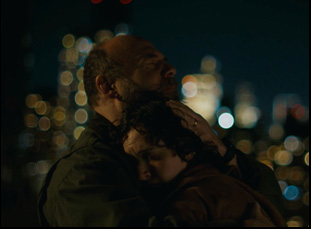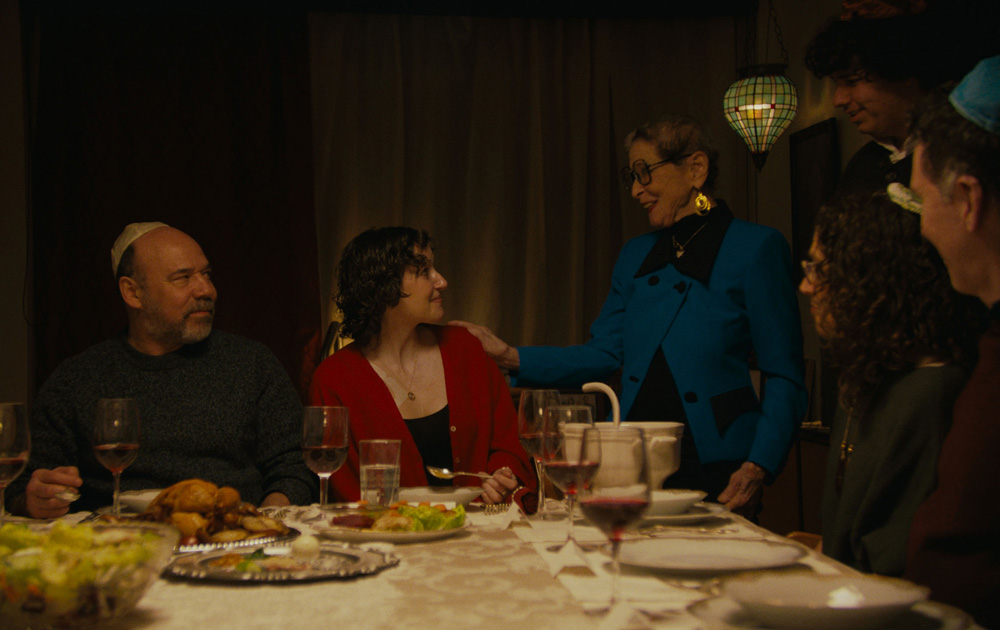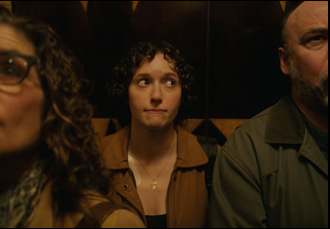“Congrats on being alive,” a cousin tells Noa (Olivia Nikkanen) as a welcome to their family’s Passover seder in “Unholy,” a status that could change by the end of the evening. There’s the immediate peril of being overwhelmed by well-meaning yet overbearing relatives who smother Noa upon arriving with her parents (Danny Burnstein and Laura Patinkin), but there is a more serious threat at play when Noa has a debilitating condition known as short bowel syndrome, which prevents her from eating solids and makes all those matzo balls that her grandmother (Roberta Pikser) wants to ladle out with love an infliction of pain either way when to eat them would complicate her health and to reject them is to feel as if she’s insulting her relatives and even her Jewish heritage.
Writer/director Daisy Friedman manages to make a film as warm and inviting as the Haggadah clan at its center while being a bit more sensitive to the situation at hand, having loosely based “Unholy” on her own experiences growing up with such a condition in a family eager to feed her. A gorgeous Seder spread may be laid out for the Haggadahs, yet it feels as if Noa is the one being served up as red meat in a lions den as relatives from her grandmother and cousin Shoshanna (Arielle Friedman) worry about her weight, thinking it’s a sign of compassion, and she can feel queasy without having anything but broth to eat with how heavy the conversation around the table becomes. Beyond finding a most unusual crisis of faith when Noa’s concerns about offending others includes God, Friedman shows a marvelous hand at orchestrating chaos and working with a talented ensemble of actors as the Seder grows contentious and a few more prayers might need to be said than the Passover standards.
With the short recently making its premiere at Sundance, Friedman graciously took the time to talk about the origins of “Unholy,” bringing the exuberant energy of a Jewish family to the screen unabated and putting off a term paper to learn she was headed to Park City.
The film is very much based on my experience with my family since I had a liver, small intestine, and pancreas transplant when I was pretty little and I had a feeding tube for a bit of my childhood. I no longer have a feeding tube, but even today, they are sometimes a bit complicated about their reactions to me with food and with eating, especially since I’m Jewish. I’m very proud to be Jewish and love the ritual, but being in those spaces that are so centered around food, they often treat it as sort of a miracle, even when I’ve been eating for many, many years. So I started thinking about that dynamic a lot between myself and my family and I wrote the script and I got it to my dear friend, Arielle [Friedman], who has a wonderful production company called Ser Nocturna based in New York City. She was really interested when I sent her the script and we just kicked it off from there.
How did you go about finding your lead? I understand you had to change ideas about who you had play Noa.
Originally, we had one of my dear friends, Sophie Burry, a student in New York City who has a multiplicity of different chronic illnesses, cast as Noa because it’s really important to me to have authentic representation in my films, specifically about disability. But unfortunately, she was not medically stable enough to really be on a set for that long, and the issue of indie filmmaking is it’s a long rolling process. You’ve got to be on your feet for 12 hours and I’m really lucky to be in a place with my health that I can do that, but she wasn’t and she ended up being our accessibility coordinator. So she was with me the entire time in the casting process and we auditioned quite a few girls for Noa. We found our incredible lead actress Olivia Nikkanen and something that Sophie said that was so sweet was “I believe she is sick more than I believe I’m sick because of her acting abilities. She is way more qualified for this.” So we knew that that’s who we were going to go with.
When there’s authenticity in all respects, was there was a Passover bootcamp for this or what it was like to, to get that part of this right.
All of the actors are Jewish, because again, it means a lot and I really wanted to make sure that there wasn’t a lot of teaching beforehand. Some of them had varying levels of religious experience. Our amazing mother, Aviva, played by Laura Patinkin is a very proud conservative Jew [in real life]. She’s probably the matriarch of her family in terms of religious practice, so she really helped everyone out. And Danny Burstein, who plays [Noa’s father] Ben, was trying to perfect this prayer at the end and he’s Jewish, but not particularly religious. He doesn’t speak Hebrew. And he told me, “Oh yeah, my friend has been really helping me with the pronunciation.” And I was like, “Oh, that’s so cool. Who’s your friend?” And he was like, “Alex Edelman.” And I was like, “Oh yeah, okay, I know him.” [laughs] So everyone was really committed to it being as authentic as possible and were really able to get behind that, which was great.
You clearly create a great environment for the actors for this to feel like a real family and I can’t imagine you were shooting shot/reverse-shot to get these great reactions. What was it like to figure out how to shoot this gregarious family dinner?
It was really hard, but really fun. I wanted it to sound as chaotic as possible. I saw an interview a few months ago with one of the sound mixers from “Maestro,” talking about the party scene in that film and how they mic’d every single party guest to not have it be dubbed in to have it be kind of as overwhelming as possible, so we started there. Every character is mid’c and my producer and I made a dialogue map because it was going to be too chaotic for people to talk over each other, so we wrote out a diagram on a piece of paper and then transferred it to a Google Doc [describing] “This line is going to go here” and “Then they’re going to speak,” and “Then they’re going to speak…” So it was very structured and we talked to our phenomenal [director of photography] Kevin Yu beforehand, [saying] “This is the run of the show for this scene and just follow this map.” The map was the guiding light and they really just followed the person speaking and if someone was speaking out of turn, [it was like] “Great, go follow them” and the camera was really the eye watching it all play out. I really wanted to take as much of a hands off approach as possible, like a fly on the wall, witnessing this insane family event.

I’m very open to improv as a director,, especially [in this case] because most of the cast were theater actors, so this is their thing. I was not about to tell them that my word was golden. Like I really wanted them to go to town. My most favorite [improvised line] was when Shoshana [played by Arielle Friedman], the cousin, is speaking about her horrible boyfriend named Josh. I wanted him to be a plastic surgeon, but that was only in my head. And the line where she says, “Oh, Noa, if you want to get a friends and family discount, we can arrange that,” that was improv. And literally every single person on set, our mouths were agape. We were so happy and also horrified that was said. But we really let a lot of it go improv and we did take after take [where we] tried one where it was all improv and one where it was scripted. As the screenwriter, I’m pretty happy that most of it really was what was in the script and the actors did a phenomenal job with it, but that particular line was not, and I was very excited about that.
Was Arielle actually always going to act in this as well as produce it?
Yes, she’s an amazing actor in her own right and she has a feature film coming up on the festival circuit that she’s a lead in this year. I always tell her she needs to get more into acting. The casting process was a little bit chaotic because we wanted to cast our Noa first, and then things fell through with Sophie, and [Arielle] said to me that she was interested in acting generally. So I was like, “Just read. I think you should just try.” And we tried and she’s so funny. She just has the best timing, so it was a no-brainer [to cast her as Shoshanna].
From what I understand, you may have planned to be an actor yourself. Is directing scratching that itch or have there been things that have carried over?
Yeah, I was planning on going to college for acting and then I found writing and it was much more gratifying in a lot of ways. As a young woman, and as someone who identifies as disabled [with] a pretty complicated medical history and body image, I didn’t feel like it was super productive to go into a field where you were being judged for your physical appearance all the time. I just don’t know if that was going to be good for me. And I think being a former actor is the reason I can be a good director. I really like directing camera, but my love is directing actors. I can understand where they’re coming from and I’ve gotten really positive feedback from my actors that they appreciate the collaborative nature of our process just because I know I can only give so much.
I remember when I was a theater actor and there would be a director who [would say], “You must do this and it must be this way.” It really bothered me, so I take that experience into my directing and I think it’s even more gratifying because as a director yyou have the power to put your take and your view on things so much more in an all-encompassing way that you can’t as an actor because you’re just fulfilling the director’s idea. I don’t love viewing directors as a power dynamic. I know a lot of people go into it because of that, but I think sharing a story together rather than being a vessel for someone else to share their story is really, really special.
You’ve created something really special here. What was it like getting the call from Sundance and getting to this point with the movie?
It was amazing. I know everyone says it, but I really deeply didn’t expect it. Full disclosure, I’m a senior in college. I was writing an essay for the midterm when I got the call and I got an e-mail from one of the programmers that [said], “Hey, can you call me? This is my number.” [And I thought] “Great, this is going to be a really beautiful, specialized personal rejection, the best I’ve ever gotten.” So I called and it was this amazing woman named Heidi, [who said] “We’re finalizing our program and we would love to have ‘Unholy’ as part of the program,” and I screamed. My roommate came in and was like, “Are you good?” It’s still unbelievable. I know a lot of people have said that they cried, and I have not. I would like to cry and I think I’ll hopefully get there. But I’ve been so overwhelmed with the beauty of it and that it’s going to be shown on such a big scale. Like, “This is my story. This is my little family. and to be able to be honored in this way, also at such a young age, is really special.
“Unholy” will screen at the Sundance Film Festival as part of Shorts Program 1 on January 23rd at noon at the Library Center Theatre, January 24th at 11 am at the Redstone Cinemas and 9:15 pm at the Broadway Centre Cinemas and January 31st at 9:40 am at the Redstone Cinemas. It will be available to watch online via the Sundance platform from January 20th through February 3rd.





